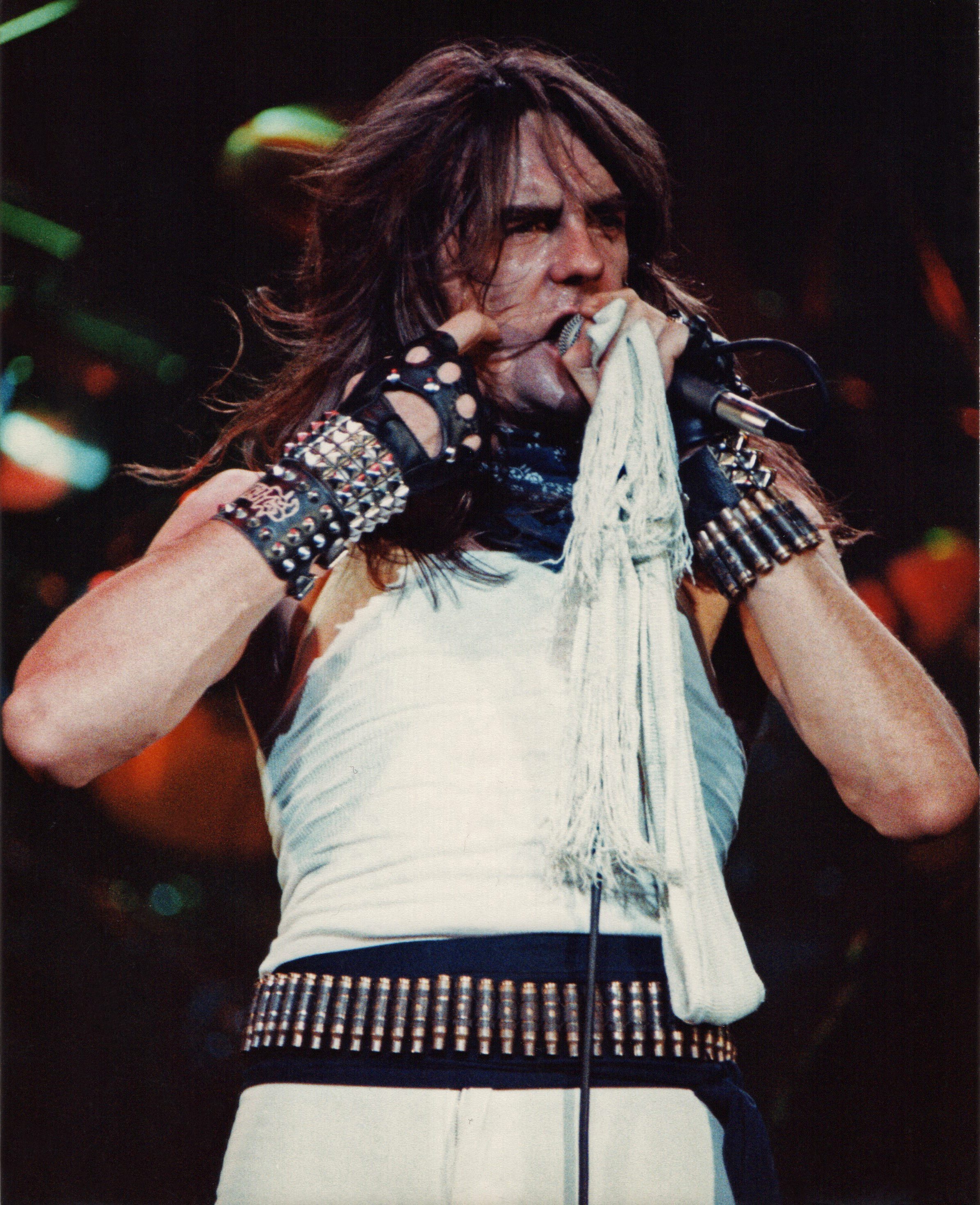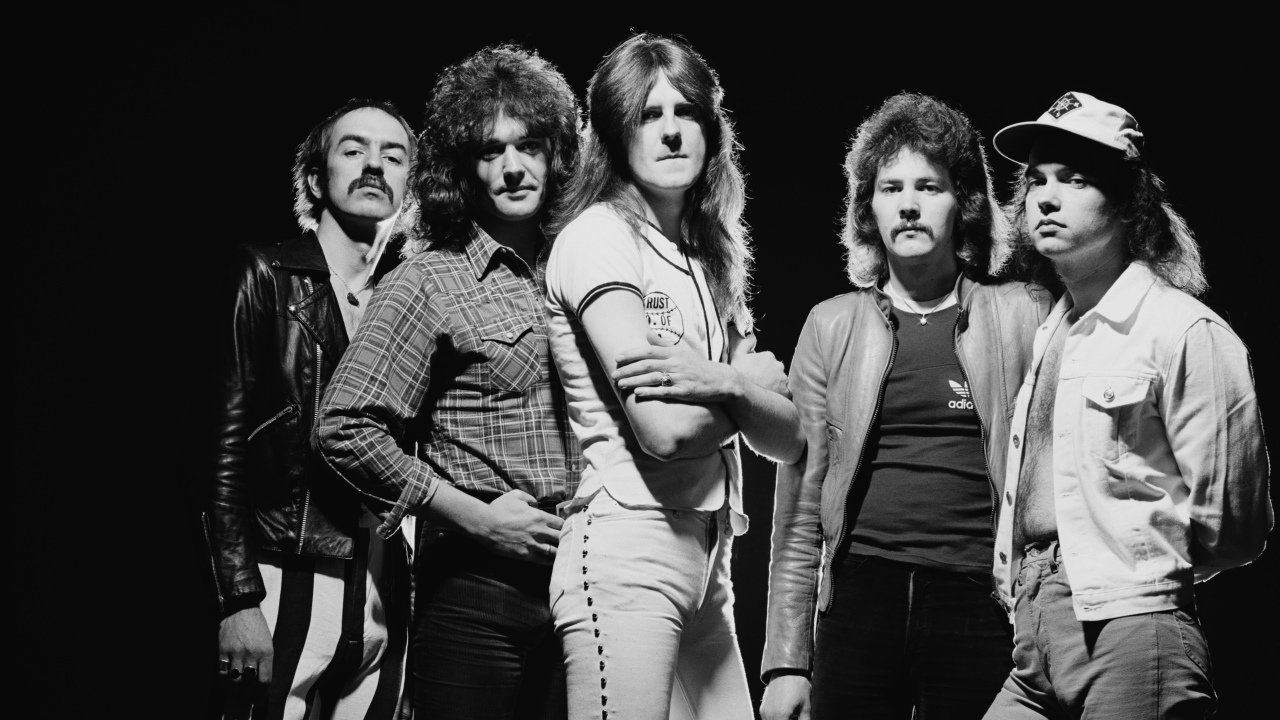Among the doyens of NWOBHM, Saxon were celebrating their 35th anniversary with an extensive UK and European tour highlighting their classic first three albums when Team Rock caught up with them.
On these dates they’re showcasing songs from three albums which are regarded as arguably their most significant, namely Wheels Of Steel, Strong Arm Of The Law and Denim And Leather. A portentous time for the band once known as the Barnsley Big Teasers (copyright Geoff Barton). And frontman/band leader Biff is in fine form as he’s just digested a curry in Denmark (“Well, it wasn’t that good, but we did have some hot sauces with it!“).
So, it’s the 35th anniversary of your debut, yet you’re not concentrating on songs from it for the tour?
“Well. We’re doing at least one song from it every night. And slowly working through the album that way. So, by the end of the tour we’ll probably have done most of the tracks on it. It’s not been forgotten.”
Did you think of doing the whole album live as a celebration?
“No, not really. You have to remember that, while it came out as a Saxon album, it wasn’t really a full band effort. Guitarist Paul Quinn and I wrote some songs together for Son Of A Bitch which ended up on the album, and [guitarist] Graham Oliver and [bassist] Steve Dawson also had some old stuff they’d co-written which we included. So, a lot of that album stretched quite a way back, and it was us cleaning house. There were a couple of new songs we came up with, faster ones like Stallions Of The Highway, but it was only with the Wheels Of Steel album that we came into our own as a band.”
Nonetheless, that debut could almost be seen as the birth of NWOBHM. You were the first band of the genre to release an album, in May 1979…
“I suppose so. But Iron Maiden and Def Leppard weren’t far behind us. It was a very exciting time for Saxon. I recall Geoff Barton coming to us play a gig in Wales around that period, and he wrote a glowing review in Sounds – that did us so much good.”
Was there a lot of camaraderie between NWOBHM bands back then?
“There was some, yeah. We saw Maiden all the time when we were on the road. We got on well with them. Leppard we didn’t see so much, despite the fact that we were both from Yorkshire. I think we all got on with our own careers, though.”
Are there some NWOBHM bands whom you feel should have been a lot bigger than they were?
“There are a few which come to mind. Tygers Of Pan Tang, Praying Mantis, Witchfynde. All good bands, certainly. Why didn’t they make it? None of them had that signature song to capture the imagination, the way we had Wheels Of Steel, for instance. But it took us a while to break through. I remember we did a show in London just before the Wheels Of Steel album came out in 1980. It was at the Electric Ballroom [February 2nd]. Sledgehammer opened, then it was Angel Witch. By the time we came on to headline, half the audience had gone!”

What turned it around for you?
“Appearing on Top Of The Pops doing Wheels Of Steel. That made all the difference for us. Also, we were lucky to be on the Carrere label, who were part of Warner Brothers. They knew how to market rock and metal bands, and get albums into the shops.”
Would you ever consider re-recording the first album?
“Why? I know technology has moved on, and we’re probably a better band now than we were back then. But, if we did it we’d be missing the point of what makes that album special to people. There’s a magic about it you couldn’t recreate. It might sound better with a 2014 production, but there’s more to making a good album that lasts in people’s minds than the production. Our first four albums are special to the fans, and there’s no way we’d be arrogant enough to think we could improve on any of them.”
How do you put together a set list for a tour, given how many albums you’ve done?
“I try to make sure we include some songs we haven’t done live for a while, and also cover our whole career. We also vary the setlist from night to night. Isn’t it boring for everyone when a band does the same songs in the same order, with the same banter each night? How do we decide what songs to do? I make that decision. Democracy in bands doesn’t work, so I tell everyone what we’re doing!”
To read more about the classic Saxon era then clock on the link below.

